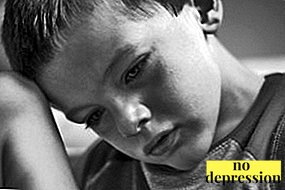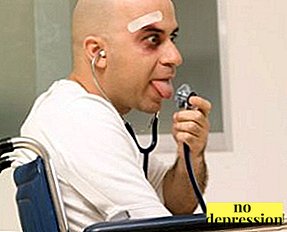Schizotypal personality disorder is a type of pathological mental disorder that is accompanied by anomalies of psycho-emotional state and thought processes.
People with such a diagnosis are closed and prone to delusional mood. This pathological condition must be treated to exclude complications.
Schizotypal personality disorder has characteristic symptoms, which can reveal its occurrence in the early stages of development.
What it is?

Schizotypal personality disorder is chronic and slowly progressive diseaseassociated with the state of the human psyche.
This disease is characterized by detachment from the generally accepted norms of behavior in the social environment, a special type of thinking and emotional state.
In medical practice, schizotypal personality disorder is often equated with a latent form of schizophrenia. The disease is incurable and manifests itself in regular bouts of exacerbation of symptoms.
Schizotypal personality type - what does it mean?
Schizotypal personality disorder and schizotypal personality type represent different states. In the first case, a certain type of mental disorder is implied, in the second, a specific trait of a person’s character.
People with this type of personality have many distinctive properties that can be alien and incomprehensible to others. This character trait increases the risk of developing mental disorders and automatically places a person at risk.
Distinctive features of people with schizoid personality type:
- complex fragmentary perception of reality (great importance is attached to trifles);
- propensity for isolation (manifested not only in the absence of a desire to make new acquaintances, but also by the scarcity of the expression of emotions, it is difficult to identify signs of joy or sadness in such a person);
 in a team, such people are distinguished by discipline, the ability to solve any problems on their own, trying to communicate with colleagues as little as possible (such people, as a rule, engage in narrow specialization and concentrate fully on their profession);
in a team, such people are distinguished by discipline, the ability to solve any problems on their own, trying to communicate with colleagues as little as possible (such people, as a rule, engage in narrow specialization and concentrate fully on their profession);- inclination to talk to oneself (a person talks to his reflection, utters questions out loud, as if consulting with someone and getting an answer).
Schizotypal disorder - what is it? Find out from the video:
Causes and risk groups
In number main causes of schizotypal personality disorder hereditary predisposition and nuances of upbringing in childhood are included.
In the first case, there is a risk of transmitting pathology. at the genetic levelif such anomalies were diagnosed not only in parents, but also in close relatives.
 In the second, ignoring children's needs, applying violence to children and various psycho-emotional experiences can provoke a pathological condition.
In the second, ignoring children's needs, applying violence to children and various psycho-emotional experiences can provoke a pathological condition.
Increase the risk of schizotypal personality disorderThe following factors:
- abuse of bad habits (especially the use of alcohol and drugs);
- genetic predisposition (increased dopamine production and mental abnormalities in the next of kin);
- the consequences of frequent stressful situations (as well as a tendency to depression);
- pathological states of the psyche during pregnancy (the consequence will be a negative impact on the formation of the psyche of the unborn child);
- peculiarities of education (lack of attention from parents, excessive care, etc.).
Intelligence in schizotypal personality disorder:
Features of manifestation in children
In children to diagnose schizotypal personality disorder extremely difficult.
One of the main features of this pathology is the manifestation of the first symptoms exclusively in adolescence and adulthood.
Some factors should alert the parents. A number of symptoms in a child may indicate a risk of developing schizotypal personality disorder in the future.
Alarming symptoms in children:
 Refusal to eat for specific reasons (cooking by the wrong person, offering food with a specific person, etc.);
Refusal to eat for specific reasons (cooking by the wrong person, offering food with a specific person, etc.);- the occurrence of eating food from only one plate (if you offer food in another dish, the child will refuse to eat);
- tendency to attacks of aggression with the slightest changes in the behavior of others (for example, the toy is not in the wrong place, the window is not open as usual, etc.);
- lack of coordination of movements (may occur in gait or sudden loss of balance of the child);
- tendency to lethargy after attacks of aggression (symptoms of weakness sharply replace aggression).
Symptoms and signs
Symptoms of schizotypal personality disorder are similar to signs of schizophrenia, but are less pronounced.
Thoughts and statements of a person with such a deviation not understandable to others. Because of this feature, his circle of communication is largely narrowed. Finding a common language with such a person can only close relatives through long-term adaptation.
Symptomatology schizotypal personality disorder is manifested in the following conditions:
- social exclusion;
- lack of bright emotions;
- propensity to communicate with fictional personalities;
- eccentric behavior;
 magical coloring of thinking processes;
magical coloring of thinking processes;- the pursuit of antisocial life;
- violation of mental functions;
- excessive closure;
- addiction to paranoia;
- mood swings;
- unwarranted attacks of aggression;
- the presence of obsessive thoughts and ideas;
- tendency to hallucinations;
- amorphous way of thinking;
- excessive suspicion.
Schizo-chemistry, schizoid accentuation, schizotypal personality disorder - differences:
Schizotypal and delusional disorders
Schizotypal and delusional disorders difficult in the initial stages. The unifying factor is the presence of deviations in thinking.
Schizotypal disorders are accompanied by delusions, but in this case the delusions will be a concomitant symptom of mental disorder.
The duration of the attacks is also different (in an independent form, delusional disorders have a short-term manifestation).
Features of schizotypal and delusional disorders:
 Delusional disorders belong to the category of mental disorders, accompanied by the emergence of a systematized delusion, characterized by sustained manifestation (for example, delusions of jealousy, delusions of grandeur, delusions of persecution, etc.).
Delusional disorders belong to the category of mental disorders, accompanied by the emergence of a systematized delusion, characterized by sustained manifestation (for example, delusions of jealousy, delusions of grandeur, delusions of persecution, etc.).- In schizotypal personality disorders, nonsense acquires a bizarre coloring (it is difficult to call a person mentally ill, his behavior is odd, but has some magical coloring, for example, a tendency to invent the presence of non-existent people, talking to oneself, etc.).
What methods include treatment?
Cure schizotypal personality disorder or reduce the manifestation of its symptoms alone impossible. The only way to effective therapy is a combination of psychotherapeutic methods and taking special medications.
If this mental disorder is identified, a visit to the doctor is inevitable. Psychotherapists are engaged in treating such a disease, but in some cases, therapy is complemented by sessions with a psychologist.
Therapy Schizotypal disorders include the following techniques:
- Cognitive-behavioral therapy (this technique is not only the main, but also the most effective way to eliminate mental disorders, the purpose of this therapy is to identify the causes of the pathological condition, the selection of methods for teaching the patient self-control, changing his thinking and perception of the environment, and reducing the risk of disease recurrence ).
 Individual and group classes with a specialist (only individual or group classes can be assigned to a patient, as well as their combination in one course of therapy, during the sessions the causes that provoked schizotypical disorders are identified, and a scheme of their maximum relief is drawn up).
Individual and group classes with a specialist (only individual or group classes can be assigned to a patient, as well as their combination in one course of therapy, during the sessions the causes that provoked schizotypical disorders are identified, and a scheme of their maximum relief is drawn up).- Family Psychotherapy (The purpose of this method is to develop the patient's correct skills of communication with relatives, in some classes the family members of his family should take part, the doctor explains in detail the optimal ways to communicate and works with the psycho-emotional state of the person).
- Classes with dolphins and horses (communication with these animals has a therapeutic effect and extremely positive effect on the psycho-emotional state of a person, especially in the presence of mental disorders).
- Drug therapy (neuroleptics, tranquilizers, antidepressants and other means to restore the psycho-emotional state of a person).
Is it possible to cure?
Schizotypal personality disorder refers to incurable diseases. Get rid of it completely impossible.
The positive moment of timely and complete therapy is quick cupping manifested symptoms and an increase in the time interval between relapses.
 Forecast with this mental disorder is individual and depends on many factors, but in most cases it is not possible to avoid repeated manifestations of the pathology.
Forecast with this mental disorder is individual and depends on many factors, but in most cases it is not possible to avoid repeated manifestations of the pathology.
With the right pathology therapy, the following are possible. favorable forecasts:
- higher education;
- good position;
- no problems in creating a family.
Disability
Schizotypal personality disorder is the basis for assigning a particular disability group to a patient (not assigned to all patients).
Such a nuance becomes cause of numerous limitations. People with this diagnosis can not engage in certain types of work (for example, work in law enforcement agencies). The patient’s quality of life due to many limitations can be greatly reduced.
Disability in schizotypal personality disorder entails the following consequences:
- prohibition of military service;
- indefinite deprivation of a driver's license or the inability to get it.

A distinctive feature of schizotypal personality disorder is chronic course.
Relapses can occur suddenly and with varying degrees of intensity.
Schizophrenia can become a complication of the pathological condition, and it will be almost impossible to get rid of it. Mental Abnormality Therapy need to start as early as possible since their first manifestations.

 in a team, such people are distinguished by discipline, the ability to solve any problems on their own, trying to communicate with colleagues as little as possible (such people, as a rule, engage in narrow specialization and concentrate fully on their profession);
in a team, such people are distinguished by discipline, the ability to solve any problems on their own, trying to communicate with colleagues as little as possible (such people, as a rule, engage in narrow specialization and concentrate fully on their profession); Refusal to eat for specific reasons (cooking by the wrong person, offering food with a specific person, etc.);
Refusal to eat for specific reasons (cooking by the wrong person, offering food with a specific person, etc.); magical coloring of thinking processes;
magical coloring of thinking processes; Delusional disorders belong to the category of mental disorders, accompanied by the emergence of a systematized delusion, characterized by sustained manifestation (for example, delusions of jealousy, delusions of grandeur, delusions of persecution, etc.).
Delusional disorders belong to the category of mental disorders, accompanied by the emergence of a systematized delusion, characterized by sustained manifestation (for example, delusions of jealousy, delusions of grandeur, delusions of persecution, etc.). Individual and group classes with a specialist (only individual or group classes can be assigned to a patient, as well as their combination in one course of therapy, during the sessions the causes that provoked schizotypical disorders are identified, and a scheme of their maximum relief is drawn up).
Individual and group classes with a specialist (only individual or group classes can be assigned to a patient, as well as their combination in one course of therapy, during the sessions the causes that provoked schizotypical disorders are identified, and a scheme of their maximum relief is drawn up).

